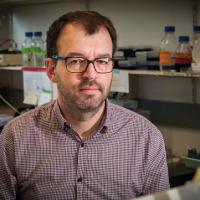
Food, Global Health Reading time 4 min
Olivier Berteau, winner of an ERC Proof of Concept grant in 2017
Published on 30 November 2017
A research director, Olivier Berteau’s work is central to the themes covered by the INRAE-AgroParisTech Joint Research Unit for Food and Gut Microbiology for Human Health (MICALIS). Specialising in the biochemistry of the microbiota, he studies novel transformations catalysed by bacteria, and notably those which lead to the formation of bioactive molecules such as new antibiotics.
Olivier Berteau had previously been awarded an ERC Consolidator grant in 2013 for his project entitled NoRaChem - Novel radical chemistry for complex peptide synthesis and engineering. He has now been given an ERC Proof of Concept 2017 grant for his D_Bug project.
From the biosynthesis of bioactive peptides…
Towards the synthesis of novel antibiotics
Olivier Berteau’s daily tasks include managing the Synthetic Chemistry and Biology team (ChemSyBio), which focuses notably on the biosynthesis of bioactive peptides. Recent work by this team allowed them to decipher novel strategies implemented by bacteria to produce new bioactive molecules, including antibiotics. The team is working in particular on a specific family of enzymes that catalyse peptide modifications. These chemical changes – attachment or substitution of a methyl group (methylation); transformation of an open chain into a closed chain (ring closure) or inversion of the amino acid configuration (epimerisation) – are often necessary to endow peptides with their biological properties. However, the mechanisms which cause bacteria to produce these modified peptides are still poorly understood. That is the challenge of the ERC NoRaChem project (ERC 2014-2019) which is trying to better understand how bacteria can generate such a diversity of modified peptides, thanks to the action of metalloenzymes.
… to a new generation of antibiotics
In the context of the 2017 call for projects from the European Research Council, Olivier Berteau’s D_Bug project – towards a new generation of antibiotics – was selected. Based on the results obtained by the ChemSyBio team, D_Bug will try to exploit these new enzyme strategies in order to produce innovative antibiotics. It will draw strength from the expertise in microbiology and biochemistry of both the ChemSyBio team, and MICALIS as a whole, and this should enable them to propose new strategies to combat the multi-resistant bacteria which pose a major problem to public health. It is also hoped that this work may have repercussions in the field of the microbiota.
ERC Proof of Concept grants target scientists who had already been carrying out an exploratory ERC project and wish to further explore its innovation potential. Olivier Berteau will benefit from funding worth around €150,000 over a period of 18 months.
- 47 years old
- Degree (Diplôme d'étude approfondie) in biological and medical engineering
- Doctorate in Chemistry, specialising in Biomaterials
- Winner of INRAE's Young Researcher Award in 2010
- Recipient of a ERC Consolidator Grant in 2013
- Loves reading and music
